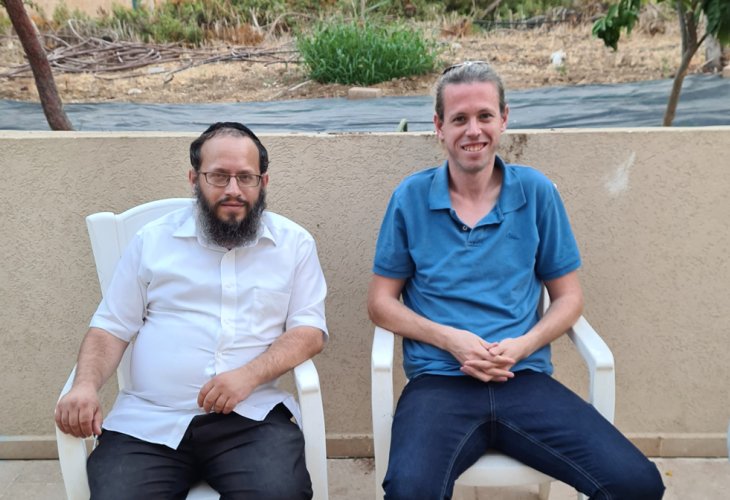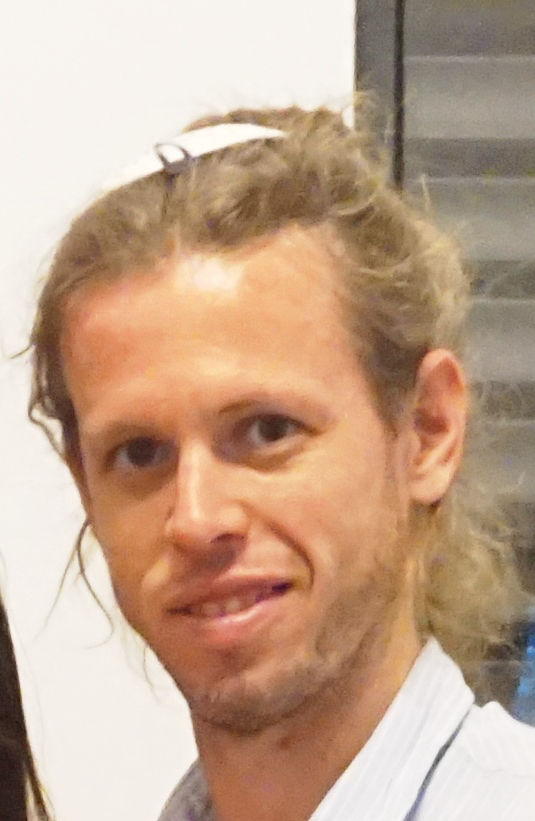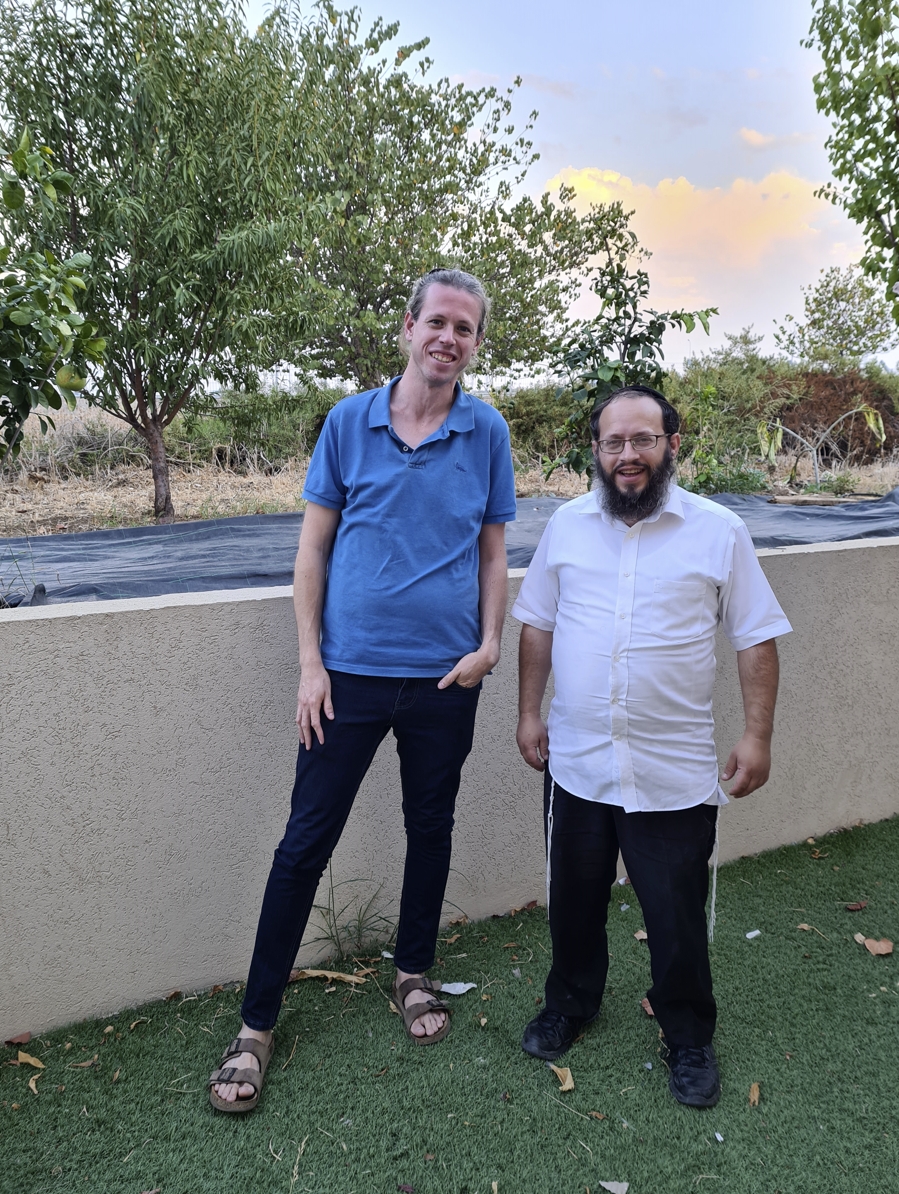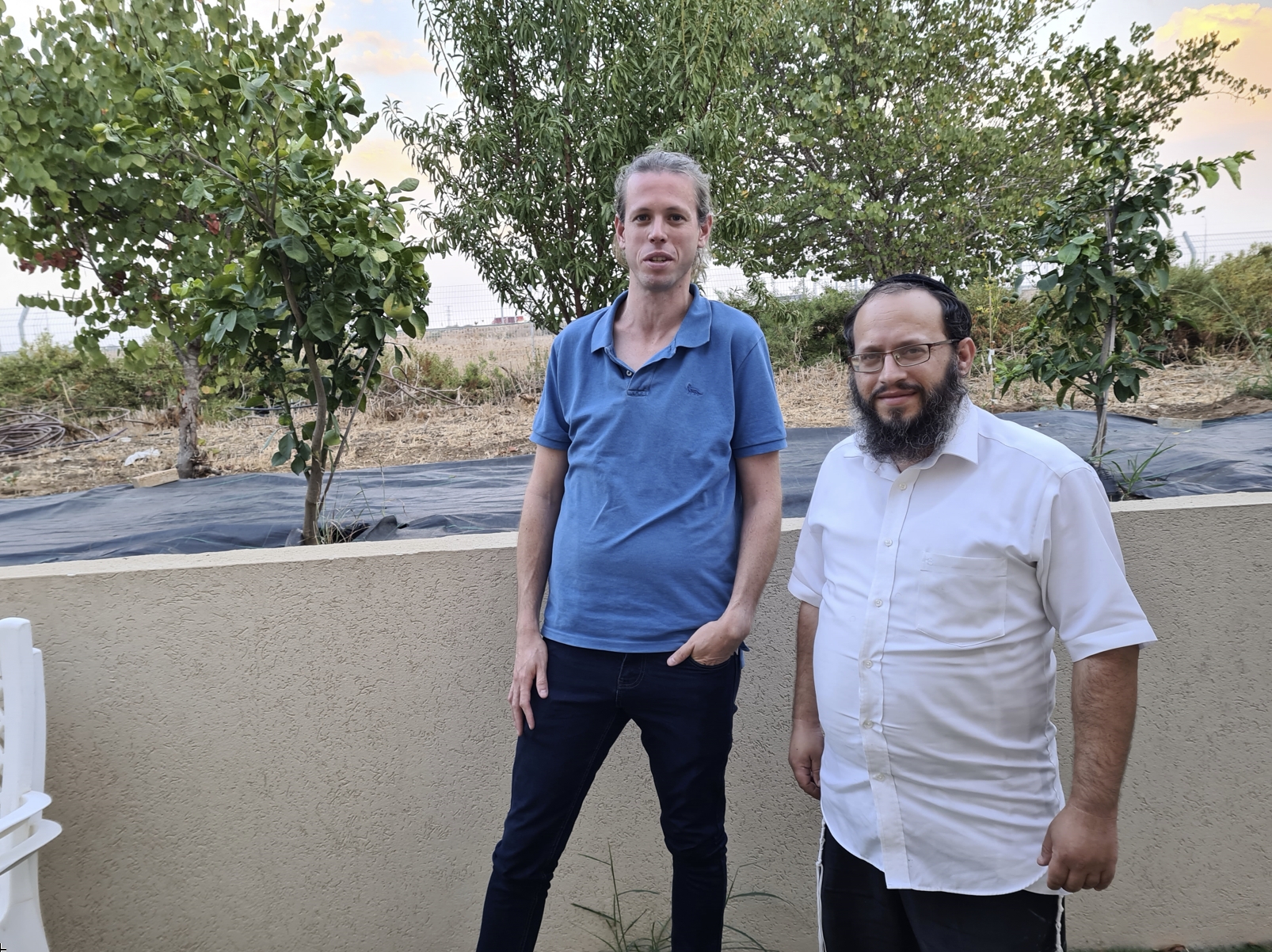"I Felt Humiliated, Afraid, Ashamed"; A Candid Interview with Inspiring People Who Stutter
This period marks Stuttering Awareness Day in Israel. In light of this, Yonatan Lieber and Israel Stern share their challenging experiences with speech fluency, the unique difficulties faced by Torah observant people who stutter, the painful experiences they endure, numerous growth opportunities, and the persistent fear that never seems to abate.
 Yonatan Lieber and Israel Stern (Photo: Avner Shaki)
Yonatan Lieber and Israel Stern (Photo: Avner Shaki)"Many people who stutter begin to stutter at some stage in their life, but I have been stuttering from birth; I know nothing else," says Yonatan Lieber, 34, married and a father of three, a resident of Beit Rimon working in human resources. We are interviewing Yonatan (and Israel Stern, whom we will meet later) about the challenges faced by people who stutter in general, particularly those related to Torah observant life, ahead of Stuttering Awareness Day, which is observed this week on Thursday, 15th of Cheshvan.
"I was born into a religious Zionist family," Lieber continues. "In my childhood, we lived in Carmiel because my parents wanted to strengthen the north both religiously and settlement-wise. Until the age of 12, my stuttering was very severe, and thank God, now it is much better. For example, there were plenty of times in class when I wanted to say something, but I almost always refrained from doing so. There were a few times when I mustered up the courage and spoke to everyone, and some friends laughed at me when it happened and even afterward. One such time is particularly memorable. I raised my hand in class, the teacher gave me permission to speak, and then I heard one of the friends say, 'Wow, by the time he finishes, we'll probably be on break.' From about the age of two, I began various speech therapies, and at age 11, before my Bar Mitzvah, I undertook another fluency therapy, and thank God, thanks to that, the level of stuttering dropped from very severe to moderate-to-light, and that definitely changed my life.
"Throughout all those years, my parents really wanted to help me, but they didn't quite know how. When I was particularly young, professionals advised them to stop speaking English at home, believing it would help with the stuttering, but the most updated research nowadays does not find any connection between the two. One of the first tension-filled events was reading the Torah at my Bar Mitzvah Shabbat. In our community, it's customary for the children to read the entire portion and the haftorah, which was very stressful. I practiced a lot, and in the end, I read excellently. People just couldn't believe it. The Torah tropes are similar to singing, and in singing, you don't stutter. Thus, coupled with the therapy I underwent, after my stuttering decreased, I began a journey of self-acceptance and love."
 Yonatan Lieber
Yonatan LieberWhat does that journey look like practically?
"It's a daily effort of investment and internalization that you need to grow from difficulty. You shouldn't avoid things. On the contrary, you should pursue what you want with full force. For example, when it was my tribe's turn to become youth movement guides, I didn't know if or how it would happen. I was very connected to the branch, but I couldn't see myself doing it. As part of the process I went through, I decided to make a mental switch and simply stepped into guiding. Until I was 12, I was very ashamed of stuttering, but after that, everything changed.
"The next major hurdle was the wedding. I feared how I would say what needed to be said under the chuppah, 'You are hereby' and 'If I forget you.' In the end, thank God, it went well, perhaps also because the rabbi officiating was the rabbi who taught at my wife's seminary, and he was a stutterer himself, which eased the pressure on me. On their wedding day, people are excited and think about a thousand things, but I mostly thought about how the words would come out of my mouth. In the wedding video, you can see my father crying when I recited the verses successfully. In general, stuttering is not an easy thing for anyone, but religious people have unique and additional challenges. For instance, every time I'm called up to the Torah, it's a very unpleasant experience. Some people even refuse it. Although I've gone through a lot as someone who stutters, even today, when I'm called up to the Torah, it's really not easy for me."
According to Lieber, a long-time volunteer and activist in AMBI - the Israeli Stuttering Association, which operates thanks to volunteers who significantly help people who stutter in various fields, one of the significant aspects of his life concerning stuttering and overcoming it was the passing of his father. "A little over a year ago, I lost my father, and up to that day, I had never served as a cantor. When he passed away, I had to say Kaddish, and it seemed like a massive hurdle I needed to overcome. It was clear to me that I had to overcome, that it couldn't be that because of this difficulty, I wouldn't pray for his soul. In my community, I received full support, and they always waited patiently when I got stuck. Last Rosh Hashanah, something very moving happened regarding this. Before the Mincha prayer of Rosh Hashanah, the gabbai approached me and asked me to lead the prayer, and I agreed. One of the guys in the kibbutz, who is a skilled cantor himself, told me it was the most powerful prayer he had during the whole holiday. One of the important things I can say about stuttering, and hardships in general, is that you need to extract good things from what is difficult and not fall and despair, God forbid. You need to take the difficulties and turn them into something good."
And it’s impossible not to ask - how does the stuttering play into your relationship and family dynamics?
"When I was looking for my match, it was always in the air. It's not something you can ignore. Practically speaking, I think only two girls rejected me because of the stuttering. And yet, as I said before, I could have been broken by this, or I could grow. So I chose to see the good. I turned the situation into something that helps me filter and refine because I understood that someone who doesn't want me because of the stutter - I don't want to know her. A stutterer is a whole person. He has his personality, diverse capabilities, various skills, etc., and to reject someone just because of this seems illogical to me.
"By the way, I talk a lot about overcoming and growing, but I don't mean to say it's not difficult. Sometimes there are tough downfalls. I didn't choose to be born a stutterer. No one wants to stutter. In general, the hardest thing for me about stuttering is that the struggle is daily and never-ending. I know I will stutter until my last day. And yes, every day there's an obstacle to overcome. Challenges I never imagined I'd have to deal with. We definitely don't want it, but since it's already there - you need to make the best out of it.
"Regarding family matters, I can say that as a young father, I was very worried about how and what would happen with stuttering. There is a hereditary effect on stuttering, but in my family, no one stutters, and thank God, none of my kids have it either. Alongside this, there are additional challenges. For example, many times we host friends for Shabbat, and I find myself really stuck during Kiddush. In these moments, I've often worried that my kids are embarrassed, that they feel uncomfortable with what's happening. Thanks to my wife's wisdom, we talked to them about it, and today they are much more accepting of having a father who stutters. I also share my struggles with them. Additionally, I see it also strengthens them. When they have difficulties, I tell them that Dad also deals with things, and it gives them strength."
Heavy Mouth and Heavy Tongue
As Lieber noted, many people who stutter begin to do so at some point in their lives, and this was also the case for Israel Stern, 39, married and a father of two, a resident of Bnei Brak, a music teacher, and a guide at a center for people with intellectual disabilities. "I started stuttering at age nine, following a trauma I experienced," Stern candidly shares. "My teacher was very violent, and it was a very difficult year for me. At that time, it was common to sometimes hit, teachers at the institution where I studied could give a slap to a misbehaving child, but he really beat us up. One of the most negative peaks with him was when he took me to a colleague's room for some foolishness I did and hit me for several minutes.
"In this context, I feel it's important to say that what I experienced wasn't the source of the stutter, but a trigger for its onset. In any case, that's how stuttering entered my life, and it was very difficult. In class, they relatively accommodated it, and hardly ever laughed at me, but in the neighborhood, they definitely bullied me. I felt the difficulties of stuttering many times and very intensely. Speech is a very important and present part of life. For instance, I remember one time when I was ten and went to ask the neighbors for a glass of milk, their daughter opened the door, she was seven then, and because I got stuck speaking, she really laughed in my face.
 (Photo: Avner Shaki)
(Photo: Avner Shaki)"She was a little girl, and I don't blame her, but to this day, I remember it as a traumatic event. I felt humiliated, afraid, ashamed. After a few seconds of being unable to speak, I ran back home. Several years later, in the small yeshiva where I studied, I was napping one day in the Bet Midrash. A few friends were sitting nearby and talking among themselves, and suddenly one friend asked, 'What is heavy mouth and heavy tongue?' and another friend answered him: 'Ask Stern.' They thought I was asleep, but I heard the entire conversation, and it really offended me."
What did you try to do to improve the complex situation you found yourself in?
"I tried various things, and one of them was learning music. In a certain sense, music gave me back the voice I had lost. Thanks to my parents, I started learning to play shortly after I started stuttering. I didn't think it would help me, but they really pushed for it, and today I'm really glad I went along with them.
"In addition," Stern continues, "the special connection I had with my great-grandfather, Rabbi Chaim Moshe Mandel, greatly strengthened me. He was a great tzadik, and a very beloved person. He was called 'the Rebbe of Rebbes.' Many rabbis would come to consult with him and receive blessings. During one of my visits to him, he looked at me and said: 'Israel, you need to ask the rabbe more questions in cheder. A shy person cannot learn.' I was stunned by how he hit the mark on what was troubling me at the time. Since I started stuttering, I never spoke in class. I had a lot to ask and contribute but was very scared. Thanks to his words, I gained courage, and it changed everything. The last time I visited him was shortly before he passed. It was later revealed to me that an hour after I left him, he was taken to the hospital because he had a heart attack. In that meeting, he told me: 'You need to speak slowly. It will help you.' To this day, he is greatly missed in my life."
According to Stern, the challenges of stuttering continued to accompany him into his adulthood, particularly concerning Torah contexts. "In the yeshiva where I studied, they called me to lead prayers three times and then stopped, and I didn't want to anymore. It was a disaster for me. Before it was my turn to be called to the Torah in yeshiva, the gabbai would go to the head of the yeshiva, talk to him for a few seconds, then call me. I'm not mad at him, he was a young guy, but I assume he asked the rabbi if I could be called up to the Torah because some people think if there are interruptions in speech then it's a blessing in vain. On this matter, I can say that I asked Rabbi Amram Fried if a stutterer can lead prayers, and he said yes, and can even serve as a kohen in the Temple because stuttering is not considered a blemish. Additionally, the words of the Maharal can also be mentioned; he said that Moses stuttered because his speech faculties couldn't handle his spiritual intensity. Maybe that's what's happening to many other people who stutter."
 (Photo: Avner Shaki)
(Photo: Avner Shaki)Compared to the past, how does stuttering affect you today?
"Stuttering bothers me to this day, but in many ways, it's very different from how it used to be. For example, I try to avoid phone calls. It's a point that is very difficult for me. When I have no choice, I call, but I prefer not to. On top of that, over the years, I rarely got called to the Torah, but in recent years I have been called more and more. Regarding leading prayers, I'm very hesitant, but I rise to the occasion from time to time. The fear always pops up, but I try to overcome it. I'm remarried, and in the dating for phase A, I was very anxious about the issue of stuttering. Sometimes after the second or third meeting, I'd talk to the girl a bit about the stuttering but only a little. I had a very big fear of how she would react.
"In phase B, it was different. I would bring up the subject as early as the first meeting, and I would say if she has anything to ask, she could do so happily. Over the years, you mature and overcome, and I hope to succeed in this matter and generally as much as possible. The struggle never ends, but the tools you have to cope are continually refined. With a lot of prayer and effort, it's possible to achieve amazing things in all areas of life. Over the years, I learned to overcome the fear, learned that I have nothing to be ashamed of. I learned to live with the stutter and not let it stop me.
"Nowadays, I also try to help people who stutter and their families, and in fact, I coordinate the Haredi branch of AMBI – the Israeli Stuttering Association. Thank God, we're doing wonderful things that help many people, and in this regard, I want to acknowledge Rabbi Shimon Kesshash from the Bnei Brak Municipality who greatly assists us in this endeavor. Additionally, when I teach music to children and they see that I stutter and yet it doesn't stop me, it provides a powerful and live example of how one can succeed despite their limitations."

